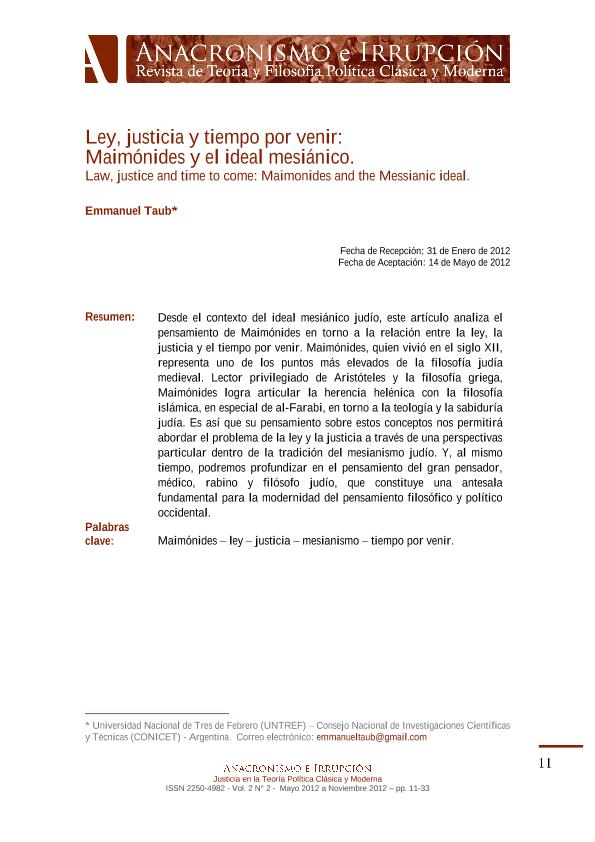Mostrar el registro sencillo del ítem
dc.contributor.author
Taub, Emmanuel

dc.date.available
2023-04-28T14:32:01Z
dc.date.issued
2012-05
dc.identifier.citation
Taub, Emmanuel; Ley, justicia y tiempo por venir: Maimónides y el ideal mesiánico; Universidad de Buenos Aires. Facultad de Ciencias Sociales. Instituto de Investigaciones Gino Germani; Anacronismo e Irrupción; 2; 2; 5-2012; 11-33
dc.identifier.issn
2250-4982
dc.identifier.uri
http://hdl.handle.net/11336/195775
dc.description.abstract
Desde el contexto del ideal mesiánico judío, este artículo analiza el pensamiento de Maimónides en torno a la relación entre la ley, la justicia y el tiempo por venir. Maimónides, quien vivió en el siglo XII, representa uno de los puntos más elevados de la filosofía judía medieval. Lector privilegiado de Aristóteles y la filosofía griega, Maimónides logra articular la herencia helénica con la filosofía islámica, en especial de al-Farabi, en torno a la teología y la sabiduría judía. Es así que su pensamiento sobre estos conceptos nos permitirá abordar el problema de la ley y la justicia a través de una perspectivas particular dentro de la tradición del mesianismo judío. Y, al mismo tiempo, podremos profundizar en el pensamiento del gran pensador, médico, rabino y filósofo judío, que constituye una antesala fundamental para la modernidad del pensamiento filosófico y político occidental.
dc.description.abstract
From the context of the Jewish messianic ideal, this article would try to analyze Maimonides thinking about the relationship between law, justice and the time to come. Maimonides, who lived in the twelfth century, is one of the most important minds of medieval Jewish philosophy. Reader of Aristotle and Greek philosophy, Maimonides was able to articulate the Hellenic heritage with Islamic philosophy –especially alFarabi– in relation with the Jewish theology. In this way, his thinking on these issues will allow us to articulate the problem of law and justice through a particular perspective within the tradition of Jewish messianism. At the same time, we would analyze the thoughts of the great thinker, doctor, rabbi, and Jewish philosopher, who is a fundamental precursor to Modernity of Western philosophical and political thought.
dc.format
application/pdf
dc.language.iso
spa
dc.publisher
Universidad de Buenos Aires. Facultad de Ciencias Sociales. Instituto de Investigaciones Gino Germani

dc.rights
info:eu-repo/semantics/openAccess
dc.rights.uri
https://creativecommons.org/licenses/by-nc-sa/2.5/ar/
dc.subject
MAIMÓNIDES
dc.subject
LEY
dc.subject
MESIANISMO
dc.subject
JUSTICIA
dc.subject.classification
Otras Ciencia Política

dc.subject.classification
Ciencia Política

dc.subject.classification
CIENCIAS SOCIALES

dc.title
Ley, justicia y tiempo por venir: Maimónides y el ideal mesiánico
dc.title
Law, justice and time to come: Maimonides and the Messianic ideal
dc.type
info:eu-repo/semantics/article
dc.type
info:ar-repo/semantics/artículo
dc.type
info:eu-repo/semantics/publishedVersion
dc.date.updated
2023-04-26T10:51:52Z
dc.journal.volume
2
dc.journal.number
2
dc.journal.pagination
11-33
dc.journal.pais
Argentina

dc.description.fil
Fil: Taub, Emmanuel. Universidad Nacional de Tres de Febrero. Centro de Estudios sobre Genocidio; Argentina. Consejo Nacional de Investigaciones Científicas y Técnicas; Argentina
dc.journal.title
Anacronismo e Irrupción
dc.relation.alternativeid
info:eu-repo/semantics/altIdentifier/url/https://publicaciones.sociales.uba.ar/index.php/anacronismo/article/view/1010/0
Archivos asociados
